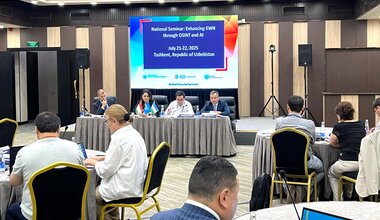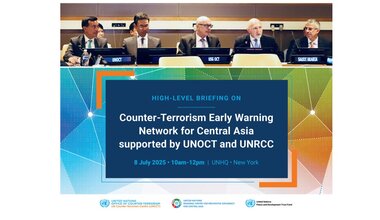UNRCCA PREVENTIVE DIPLOMACY ACADEMY ENGAGES CENTRAL ASIAN YOUTH IN ADVANCING THE GLOBAL WOMEN, PEACE AND SECURITY AGENDA
ASHGABAT, Turkmenistan
As the international community commemorates the 25th anniversary of United Nations Security Council Resolution 1325 on Women, Peace and Security (WPS), and the 80th anniversary of the founding of the United Nations, the UNRCCA remains committed to advancing gender equality and promoting inclusive peacebuilding across the region.
In this context, on 2 July 2025 the UNRCCA convened an interactive virtual session for the 2025 cohort of its Preventive Diplomacy Academy (PDA), focused on the global Women, Peace and Security agenda. The event brought together young leaders from Central Asia and Afghanistan to deepen their understanding of gender-responsive approaches in the promotion of peace and security.
The session commenced with a presentation by Mr. Andrey Khanzhin, Political Affairs Officer at UNRCCA, who outlined the core principles of Security Council Resolution 1325, which acknowledges the disproportionate impact of conflict on women, and calls for their full, equal and meaningful participation in peace processes, as well as protection from gender-based violence in conflict-affected settings. Mr. Khanzhin emphasized the importance of women’s engagement in decision-making, conflict prevention, peacebuilding and governance, and the integration of gender perspectives in all peace operations.
Following the presentation, participants engaged in an interactive discussion on the practical implementation of the global WPS agenda in the region. The dialogue highlighted the importance of regional cooperation in promoting gender equality and addressing persistent challenges, including patriarchal norms, limited access to resources, and gaps in the implementation of national frameworks, particularly underfunded or partially implemented National Action Plans.
The session also featured group discussions, moderated by Ms. Nataliya Chemayeva, which enabled participants to examine current challenges and opportunities related to WPS implementation. The discussions further explored the linkages between the global Women, Peace and Security and Youth, Peace and Security agendas.
A presentation on the UNRCCA’s Women Leaders’ Caucus showcased regional efforts to strengthen women’s leadership and participation in peace processes. The Caucus was recognized as a vital platform to elevate women’s voices and enhance inclusive decision-making at all levels.
Participants also discussed critical regional trends, including the rise of gender-based violence, persistent gender stereotypes, and the intersectional impacts of climate change on peace and stability. They underscored the need for stronger data systems, increased inclusion of women and youth, and full implementation of normative commitments to translate global frameworks into national and local action.
The UNRCCA Preventive Diplomacy Academy reaffirms its commitment to supporting the global Women, Peace and Security agenda in Central Asia by empowering youth and women with the knowledge and tools to contribute to inclusive and sustainable peace. Through continued engagement, the UNRCCA PDA serves as a platform to foster regional dialogue, strengthen cooperation and build resilience in addressing current and emerging peace and security challenges.
 UN
UN





